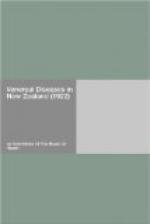A sounder state of public opinion needs to be cultivated. The moral stigma at present attached to sufferers from venereal disease should rest upon all who sacrifice to their own selfish passions the chivalrous relations which should subsist between the sexes. Those who are unfortunate enough to contract disease incur a punishment so terrible that they deserve our pity and our succour, always provided that they seek skilled treatment and refrain from any conduct likely to communicate the disease to others. The man or woman who negligently or wilfully does anything likely to lead to the infection of any other person is a criminal, and should be treated as such.
To bring about this healthier state of public opinion much might be done by the various Churches, by the Press, and by all who are in a position to influence the thoughts of others. It is a duty which should be shared by all—it cannot be left entirely to the Government, to Parliament, or to the medical profession. If a healthier atmosphere were created for the proper consideration of this subject, instead of the unwholesome fog of prudery in which it has been enveloped in the past, a great deal will have been gained.
One result of the mistaken policy of reticence which has prevailed is to be seen in the fact, already mentioned, that children are allowed to grow up either in ignorance of sex physiology or with perverted ideas due to the want of proper instruction. Nearly every witness who spoke on the subject before the Committee agreed that such instruction would come best from the parents, but there is also practical unanimity among those who gave evidence that very few parents are capable of giving such instruction in the right way, and the vast majority are unwilling to attempt it. In these circumstances our chief hope for the future seems to lie in an endeavour to educate the children in such a way that they, the parents of the future, may be enabled to deal justly with their own children in this vital matter. Nevertheless, the Committee would be failing in their duty did they not point out that all parents have a serious responsibility to their children which they cannot evade without laying themselves open to grave reproach. It is probable, as one of the witnesses remarked, that “nothing they could do for their children’s happiness in life would be of equal value to the outlook which they might give to their children upon this matter. Apart from any possibility of moral ruin or disease, such an outlook would colour the whole mature life of their children in respect to what is probably the foundation of the greatest human happiness—namely, home relationship.”
The Committee recommend that the Department of Health be asked to prepare a suitable pamphlet to assist those parents who desire to instruct their boys and girls on this subject. It is also suggested that where parents feel themselves unable to undertake the necessary instruction, the family doctor should be asked to talk to the boys. Instruction to the girls should certainly come from the mother, but failing this a little wise counsel and advice from a woman doctor should be secured.




